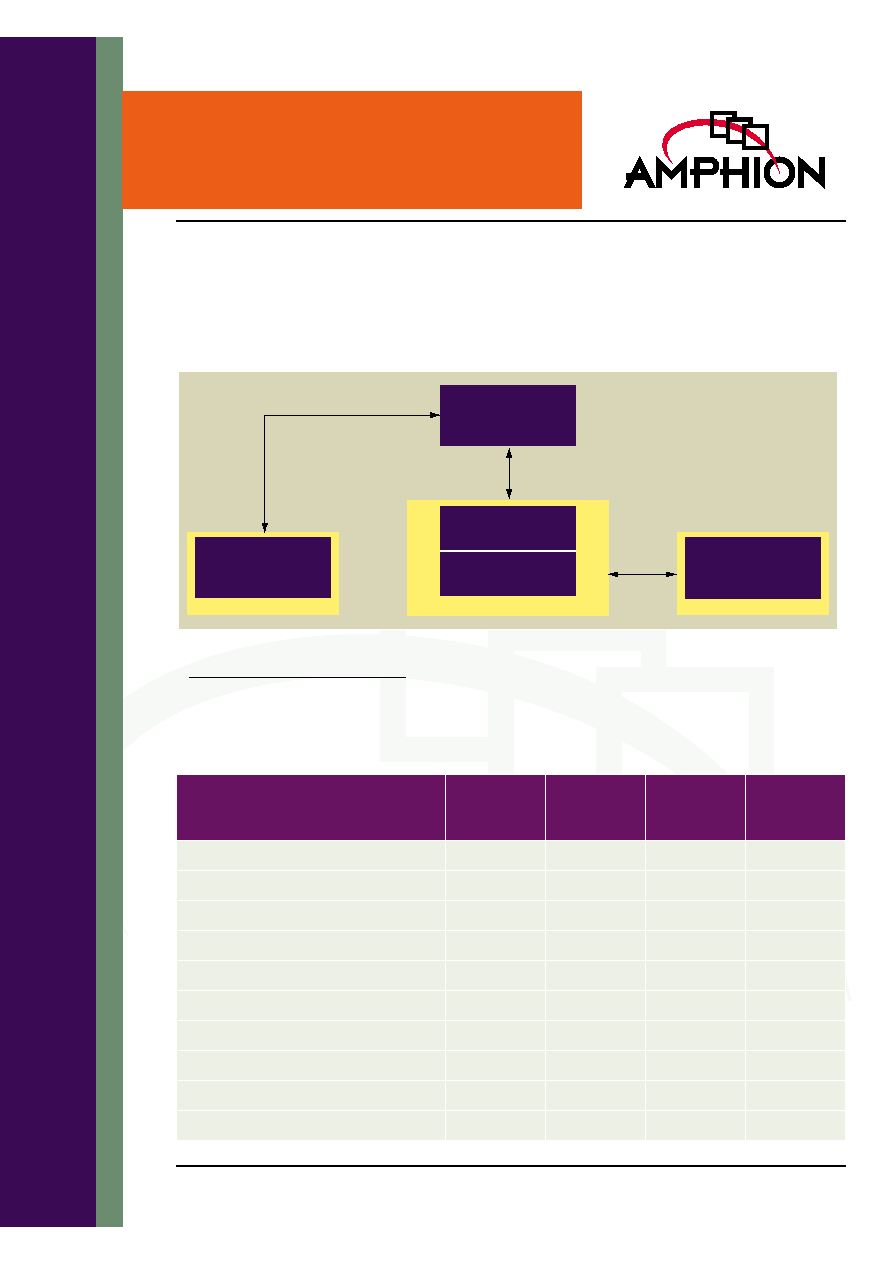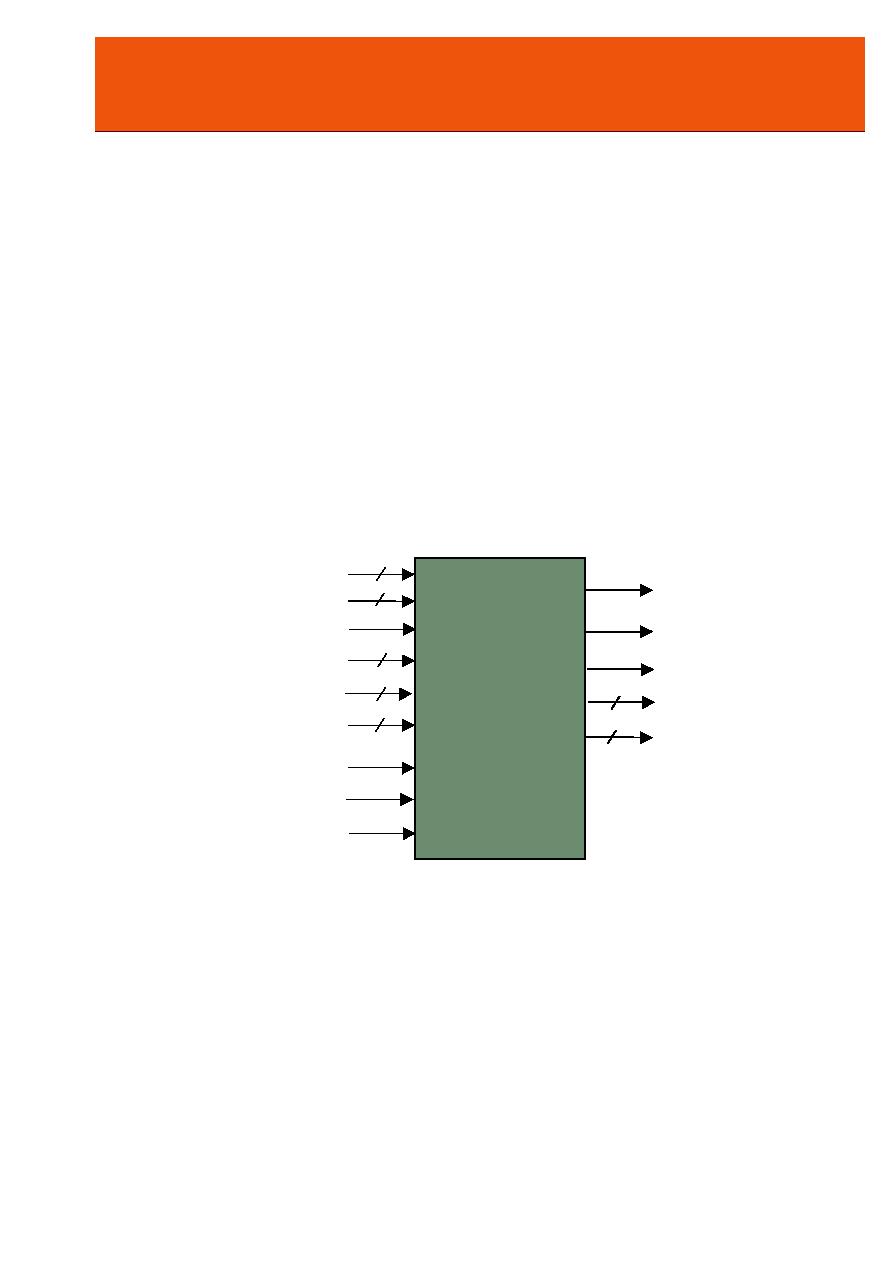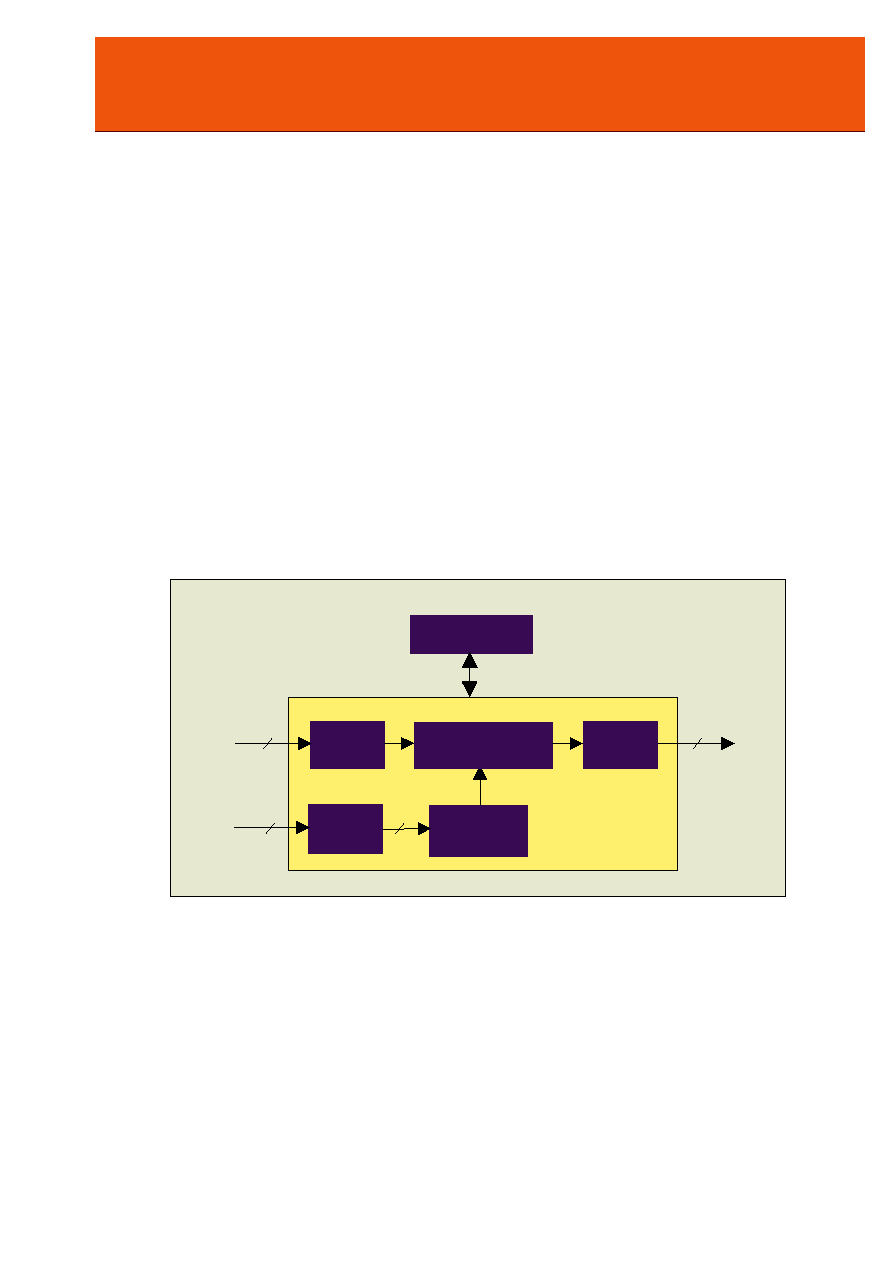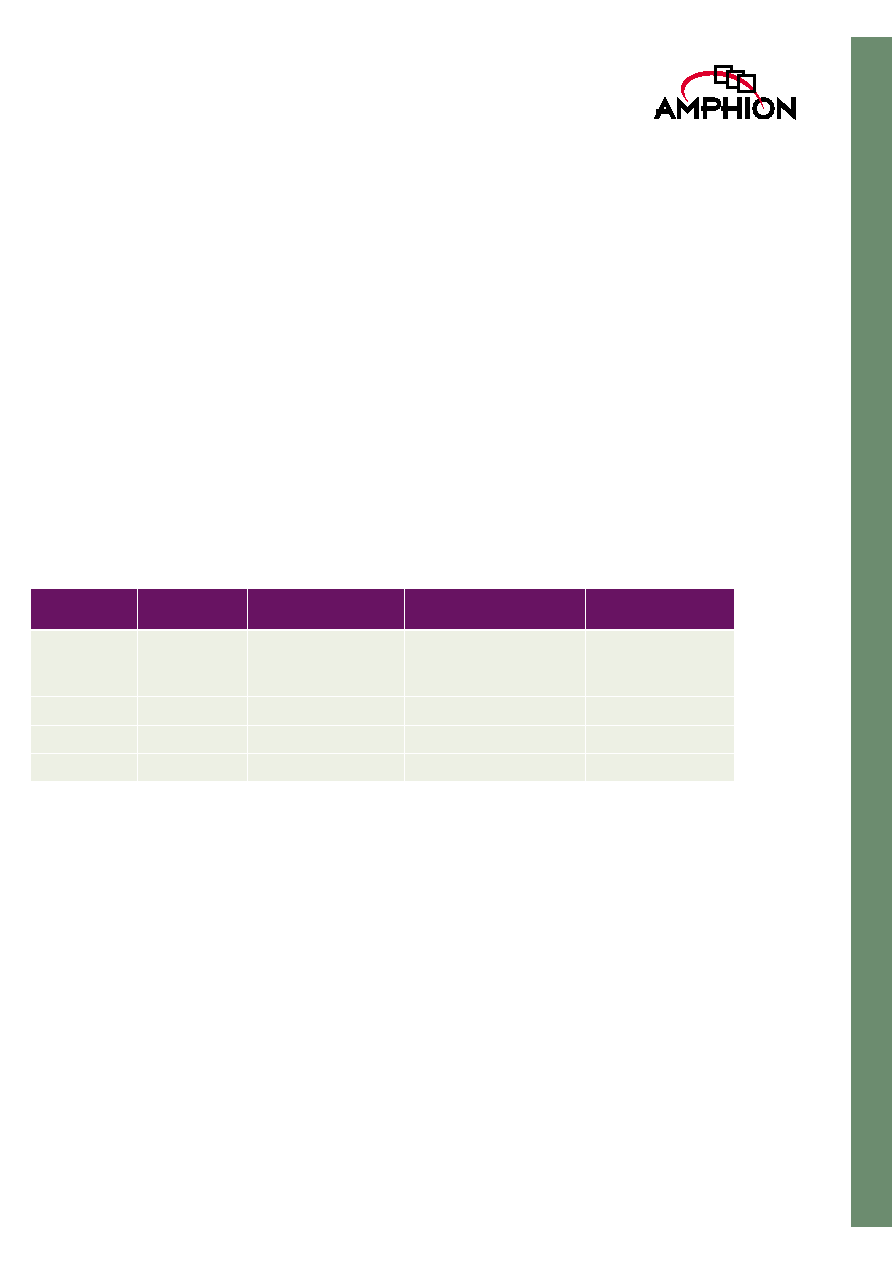
TM
Virtual Components for the Converging World
Amphion continues to expand its family of application-specific cores
1
See http://www.amphion.com for a current list of products
CS5250-80
High Performance AES Decryption Cores
The CS5250-80 series of decryption cores
1
are designed to achieve data privacy and authenticity in digital
broadband, wireless, and multimedia systems. These high performance application specific silicon cores support
the AES (Rijndael) algorithm as described in the NIST Federal Information Processing Standard. They can be
used in conjunction with the CS5210-40 series of Amphion AES encryption cores to rapidly construct complete
security solutions. The CS5200 family of cores are available in both ASIC and programmable logic versions that
have been hand crafted by Amphion to deliver high performance while minimizing power consumption and
silicon area.
Figure 1: Example of a Satellite and Point-to-Point Secure Communication Scheme Using AES
1. Patent pending
Long Distance Location
Ground Station Uplink
Ultra High Speed AES
Location #1
Ground Station Uplink
Ultra High Speed AES
Metropolitan Link
High Speed AES
Location #2
Metropolitan Link
High Speed AES
Satellite Downlink
Ultra High Speed AES
DECRYPTION CORE FEATURES
Table 1: CS5250-80 Features at a Glance
CS5250
Standard
CS5260
Compact
CS5270
High Speed
CS5280
Ultra High
Speed
Fully compliant with AES NIST FIPS
�
�
�
�
128-bit data block
�
�
�
�
128-, 192-, 256-bit keys on-line selectable
�
128-bit keys only
�
�
�
32-bit I/O
�
�
�
128-bit I/O
�
Electronic Codebook mode (ECB)
�
�
�
�
Output Feedback mode (OFB)
�
�
�
�
Cipher Block Chaining mode (CBC)
�
�
�
Cipher Feedback mode (CFB)
�
�
�

2
CS5250-80
High Performance AES Decryption Cores
APPLICATIONS
Electronic financial transactions
-
eCommerce
-
Banking
-
Securities exchange
-
Point-of-Sale
Secure corporate communications
-
Storage Area Networks (SAN)
-
Virtual private networks (VPN)
-
Video conferencing
-
Voice services
Personal mobile communications
-
Video phones
-
PDA
-
Point-to-Point Wireless
-
Wearable computers
Secure environments
-
Satellite communications
-
Surveillance systems
-
Network appliances
CS5250-80 SYMBOL AND
PIN DESCRIPTION
Table 2 gives the descriptions of the input and output ports
(shown graphically in Figure 2) of the CS5250-80 series of AES
decryption cores. Unless otherwise stated, all signals are
active high and bit(0) is the least significant bit.
Figure 2: CS5250-80 Symbol
CS5250-80
CLK
RST
NKS
(CS5250 only)
LDKY
KADDR
IKEY
LOAD
DAADR
D
KSTAT
DSTAT
QSTRB
QADDR
Q

3
TM
Table 2: CS5250-80 Standard Rijndael Decryption Interface Signal Definitions
Signal
I/O
Width (Bits)
Description
D
I
32 (128)
Cipher text data (128-bit width for CS5280)
DADDR
I
2
Cipher text data address, 0: the lowest 32-bit word
LDKEY
I
1
Load inverse cipher key
IKEY
I
32 (128)
Inverse cipher key (128-bit width for CS5280)
KADDR
I
3
a
Inverse cipher key address, 0: the lowest 32-bit word
NKS
I
2
Inverse cipher key size select
(CS5250 only)
When 00: Selects a 128-bit Key
When 01: Selects a 192-bit Key
When 1X: Selects a 256-bit Key
LOAD
I
1
Load ciphertext enable
CLK
I
1
System clock, rising edge active
RST
I
1
Asynchronous reset
KSTAT
O
1
Key port status, when Asserted, loading of cipher keys is not allowed
DSTAT
O
1
Input port status
The next cycle after text D[3] (the highest word of 128-bit clock) is
loaded, DSTAT will be De-asserted to indicate decryption is in progress.
It will be Asserted when the core is ready for loading the highest word of
the next 128-bit text. The lower three words can be loaded at anytime in
the period when DSTAT is LOW depending on the key-size selection.
QSTRB
O
1
Output strobe indicating the Plaintext word Q is valid
QADDR
O
2
Plaintext data address, 0: the lowest 32-bit word
Q
O
32 (128)
Plaintext data (128-bit width for CS5280)
a. 3 bits wide for the standard; 2 bits wide for compact/high speed cores; not applicable for ultra high speed core

4
CS5250-80
High Performance AES Decryption Cores
FUNCTIONAL DESCRIPTION
The Rijndael algorithm is an iterated block cipher that
encrypts and decrypts data in 128-bit data blocks using a
128-bit, 192-bit, or 256-bit key. The algorithm consists of:
�
An initial data/key addition
�
Nine, eleven or thirteen rounds when the length is
128-bits, 192-bits, or 256-bits respectively
�
A final round which is a variation of the typical round
Figure 3 represents a block diagram of the Rijndael decryption
algorithm. A Rijndael round transforms the data using
permutations, non-linear substitutions, additions and Galois
field multiplications. The Rijndael key schedule consists of
two parts:
1.
Key Expansion - expands the cipher key into a linear
array of 4-byte words
2.
Round Key Selection - selection of the required number of
Round Keys from the expanded key array
All four versions of the Amphion AES decryption cores follow
the block diagram shown in Figure 3.
The CS5200 AES decryption cores are outstanding matches
with other Amphion cores. For instance they can be combined
with the CS6650 MPEG2 Decoder to easily provide a secure
high definition closed-circuit TV system, and they can be
combined with the CS3252 FEC Codec as part of a secure
wireless access point.
The Amphion encryption/decryption cores are also an
excellent choice for VPN security ICs incorporated into
broadband switches, routers, firewalls and remote access
concentrators. Likewise, the cores are an ideal fit for the
Secure Socket Layer (SSL) channel ICs used in Web servers,
WAP gateways and other access applications requiring a high
number of parallel SSL channels to carry out eCommerce.
Figure 3: Block Diagram of CS5250-80 Series of Decryption Cores
Ciphertext
Control Logic
Input
Buffer
Key
Scheduler
Key
Buffer
Inverse Key
Plaintext
Round
Transformations
Output
Buffer

5
TM
AVAILABILITY AND IMPLEMENTATION INFORMATION
Hardware accelerated AES technology is governed internationally by export regulations. The Amphion AES cores listed in this
datasheet have been officially reviewed and classified by the UK Department of Trade and Industry and US Bureau of Export
Administration. These cores are licensed for immediate export to the following countries:
Austria
Australia
Belgium
Canada
Czech Republic
Denmark
Finland
France
Germany
Greece
Hungary
Ireland
Italy
Japan
Luxembourg
New Zealand
The Netherlands
Norway
Poland
Portugal
Spain
Sweden
Switzerland
United Kingdom
United States
For delivery to other destinations, please contact Amphion. Approval is subject to applicable export regulations. Licensees of the
Amphion AES cores are responsible for complying with applicable requirements for the re-export of electronics containing AES
technology.
ASIC CORES
For applications that require the high performance, low cost and high integration of an ASIC, Amphion delivers the application
specific silicon cores that are pre-optimized to a targeted ASIC technology by Amphion experts.
Consult your local Amphion representative for product specific performance information, current availability of individual
products, and lead times on ASIC core porting.
Table 3: CS5250-80 Family of ASIC Cores using TSMC 180nm Process and Standard Cell Libraries
PRODUCT ID
LOGIC
GATES
CYCLES PER
OPERATION
TIMING CONSTRAINT (MHz)
DATA RATE
(MBITS/Sec)
CS5250TK
19.2K
44
a
52
b
60
c
a. Implementation of 128-bit key length
b. Implementation of 192-bit key length
c. Implementation of 256-bit key length
200
581
a
492
b
426
c
CS5260TK
16.4K
44
200
581
CS5270TK
34K
11
200
2,327
CS5280TK
283K
1
200
25,600




